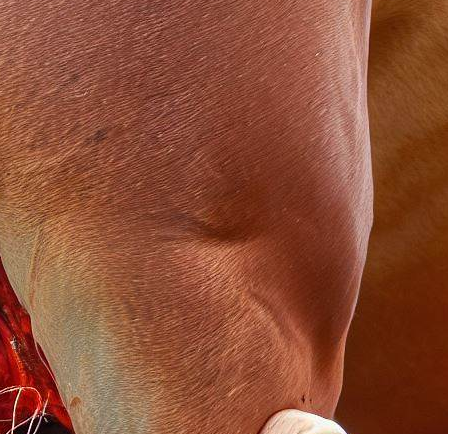Equine neurectomy is a surgical treatment that involves cutting or removing a particular nerve, frequently the palmar/plantar digital nerves, in order to treat horses' persistent leg or hoof pain. This procedure disrupts the nerve's capacity to convey pain signals to the brain, thereby lowering or eliminating pain feelings in the affected area.

The horse is given general anesthesia throughout the neurectomy process to ensure its safety and well-being. The veterinarian uses modern imaging tools to identify the targeted nerve and makes a tiny incision around the nerve site. Depending on the procedure, the nerve is then cut off or eliminated. The incision is carefully stitched up, and the horse is allowed time to recover from anesthesia.
Pros
Pain Relief
Equine neurectomy's ability to significantly reduce the pain experienced by horses with chronic limb or hoof pain is its main advantage. By blocking the pain impulses, the horse feels a significant reduction in discomfort, resulting in a better quality of life.
Enhancing Performance
Following a neurectomy, horses whose performance had previously been hampered by chronic pain frequently display improved performance. They are able to move with greater freedom and perform better in a variety of sports, including racing, jumping, and dressage, when they are pain-free.
Management of Chronic Conditions
Equine neurectomy is a viable alternative to conventional therapies in the management of chronic problems like laminitis or navicular syndrome. When all other measures have failed, it provides an alternate strategy for easing pain.
Cons
Loss of Feeling
The fact that neurectomy permanently destroys sensation in the affected area is a big problem. While this can help with pain management, it may also conceal injuries or other problems that the horse might have had in a normal situation.
Limited diagnostic abilities
Once the nerve is cut off it is more difficult to diagnose any potential problems that might develop later on in the treated area. Future treatment approaches may become more complicated as veterinarians struggle to identify new diseases or the cause of discomfort.
Risk of Overuse and Dependency
In some situations, neurectomy may be considered a quick remedy to a problem, leading to its misuse. Without treating the underlying source of the pain, relying entirely on this technique could result in dependency and future consequences.
Considering the Ethics
It is important to not take the decision to perform an equine neurectomy lightly. It raises moral concerns about the well-being of the horse and the procedure's possible long-term effects. Before making a final decision, horse owners and veterinarians should carefully assess whether neurectomy is the best option and look into alternative therapies.
Equine Neurectomy Alternatives
Horse owners and veterinarians should look into less invasive options before choosing neurectomy:
Medications
Without resorting to surgery, a number of drugs can assist manage pain and inflammation. Non-steroidal anti-inflammatory medicines (NSAIDs) and other painkillers may be effective and should be taken into consideration.
Rehabilitation and physical therapy
Physical therapy and rehabilitation can be incorporated into the horse's routine to assist recovery and naturally reduce pain. Controlled exercise, cold therapy, and heat therapy are all effective methods.
Alternative Therapies
Alternative pain management methods could be investigated as a complementary therapy, including acupuncture, chiropractic adjustments, and herbal supplements.
